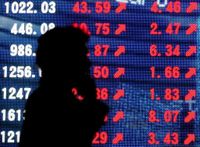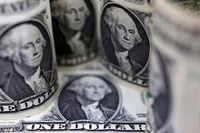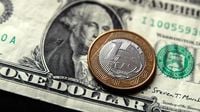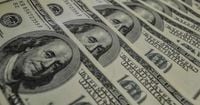On Monday, April 7, 2025, the dollar opened strong against the Brazilian real, trading at R$ 5.8848, marking a rise of 0.85%. This increase follows a significant jump of 3.68% on Friday, April 4, when the dollar closed at R$ 5.83, the most substantial daily increase since November 2022. The market continues to react to fears of a global recession fueled by escalating trade tensions, particularly after President Donald Trump announced a series of tariffs on imports.
The escalating trade war has seen China retaliate with its own tariffs, which are set at 34% for American imports. As a result, global stock markets have experienced severe losses, with the Hong Kong market suffering its largest daily drop since 1997, plummeting by 13.22%. Meanwhile, indexes in Japan and Germany also reported significant declines, with Tokyo's market down 7.8% and Frankfurt's down 7.86%.
Investors had hoped that Trump might reconsider the tariffs over the weekend. However, Trump stated on Sunday, "I didn't break the market on purpose. I don't want anything to fall, but sometimes you have to take remedies to fix something." This comment has left investors feeling uneasy, as they brace for further market instability. According to Ágora Investimentos, "Monday begins with the selloff deepening in major global markets. For those who expected a retreat, Donald Trump adopted an even more challenging tone."
As the dollar continues to rise, it reflects broader concerns about the economic climate. By 10:10 AM on April 7, the dollar was trading at R$ 5.876 for purchases and R$ 5.877 for sales, indicating a 0.69% increase. The Brazilian stock market, the Ibovespa, opened lower, falling 1.9% to 124,844 points as fears of a recession loom large.
In light of these developments, the Focus bulletin showed a reduction in the projection for the dollar at the end of 2025, dropping from R$ 5.92 to R$ 5.90, down from R$ 5.99 just a month ago. Economists suggest that the dollar's rise will likely lead to increased costs for everyday items in Brazil, as imported goods become more expensive. This could result in higher inflation rates, as noted by André Braz, an economist at the Brazilian Institute of Economics. He explained that the currency exchange rate pressures the prices of globally traded items, which could have a cascading effect on consumer prices.
As the situation unfolds, the Chinese government is reportedly preparing extraordinary measures to mitigate the impact of the tariffs. They have organized meetings with American business representatives, including companies like Tesla and GE, to discuss potential strategies moving forward. Meanwhile, the European Union is contemplating countermeasures against up to $28 billion in imports from the United States, as tensions between the two economies escalate.
In the United States, the S&P 500 has fallen more than 20% from its peak, indicating a bear market, as investors seek safer assets amidst fears of a recession. Trump has stated that he will not negotiate with China until the U.S. trade deficit is addressed, further complicating the situation.
Amidst the turmoil, the oil market has also been affected, with prices dropping by 3% on April 7, as concerns over global demand rise in light of the trade conflict. Brent crude futures fell to $63.84 per barrel, while U.S. crude (WTI) dropped to $60.35, marking significant losses from the previous week.
Cryptocurrencies have not been spared from the market's volatility either, with Bitcoin experiencing a decline of over 7%, trading at $76,712 and falling below the $80,000 mark it reached during Trump's election. Other cryptocurrencies, such as Ethereum and Solana, also saw substantial drops, highlighting the widespread impact of these economic shifts.
As analysts continue to assess the situation, the overall sentiment remains cautious. The potential for a recession looms large, and the implications of Trump's tariff policies are beginning to ripple through various sectors of the economy. The coming days will be crucial as investors and governments alike navigate this complex landscape.








